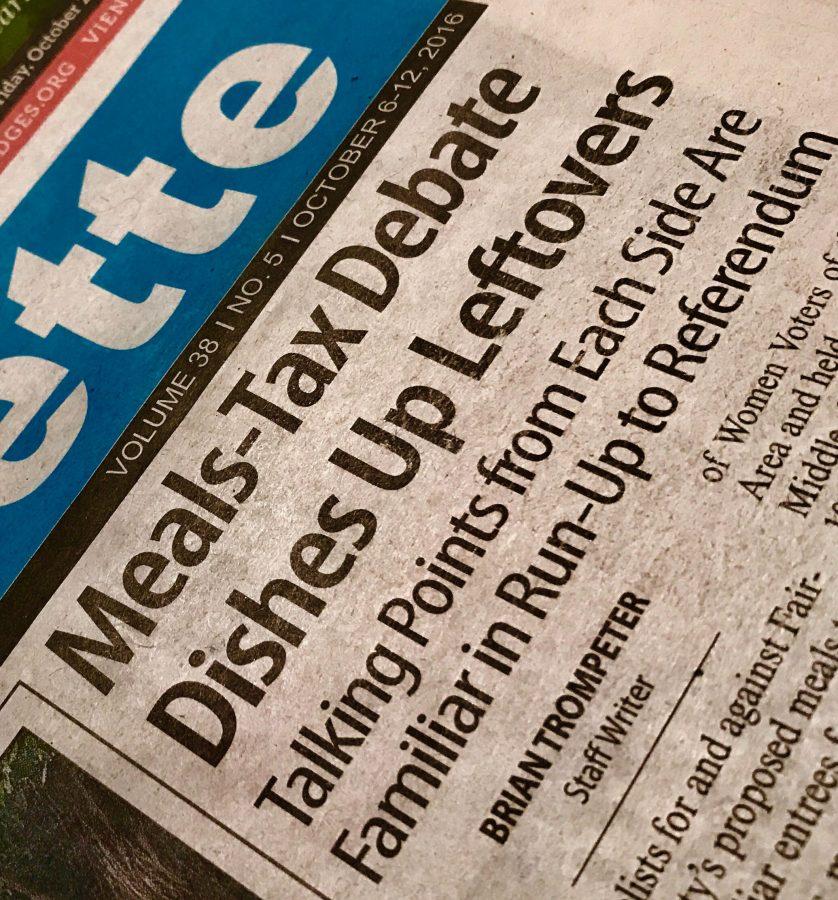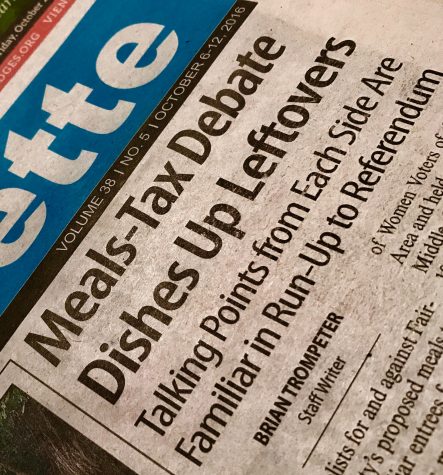Meals Tax: 2016 Edition
On November 8th, 2016, Fairfax County held a referendum on the 4% prepared Meals Tax. The revenue from this tax was going to be allocated to two different purposes. The first, and most notable of the two, is that 70% of the net revenue would be dedicated to Fairfax County Public Schools. Second, 30% of the net revenue would be dedicated to county services, capital improvements, and property tax relief.
The proponents of the bill argued the good it could do for the community outweighs any other possible negatives. Brianna Murphy, a student at Oakton High School, favors the Meals Tax because, “Of where it was supposed to go and what it was supposed to do for our community. I also know my family can afford the cost.” When asked if there were any possible negatives to the bill, Murphy responded, “I think a lot of the disapproval of the tax was that it was uncertain if the school board would hold its promise. But that’s not a problem with the tax that’s a problem with the members of the board and if we don’t trust them enough to correctly put money where we would like it to go then we should be voting them out next cycle.”
Another argument raised on behalf of the Meals Tax was the tax would diversify revenue sources for the county. Kevin Hickerson, the President of the Fairfax Education Association, said, “Right now, we rely heavily on residential and commercial property taxes to fund our county. This is unsustainable in the long run. We also would have raised 100 million dollars with about 30 percent coming from outside of the county.” This is an important, and seldom talked about, point for the Meals Tax. If Fairfax County had enacted the Meals Tax, property taxes as a whole could have been reduced. But as Mr. Hickerson said, “I think there was a good effort by opponents to make it seem like the tax would be onerous to the restaurant industry by affecting the servers because of tips. They also made an argument that said it would be too expensive for poorer families. Each of those arguments are able to be debunked with some context but that’s difficult in a sound bite world.”
A popular counter argument of the individuals against the Meals Tax argue the community of Fairfax County cannot trust the Fairfax County Supervisors to send the revenue to the Fairfax County Public Schools system. Lauren Zarnock, a student at Oakton High School, argued the tax is “ridiculous and there’s no guarantee the extra revenue would even go to the teachers. The school board gets to decide what to do with it and that’s a mistake right there. Local/state governments aren’t good at managing money anyways so why give them more to mess around with. It’s just bad all around: looks good on paper, works out terribly in practice.”
This is a belief held by many people, not just the odd student. Andrew Domes, a resident of Fairfax County for the past 43 years also believes it was for the best that the tax didn’t pass. When asked if he had seen anything like this before, Mr. Domes responded with, “Sure have. About 25 years ago, this same tax was on the ballot and people didn’t vote for it because they knew that the money would be mismanaged by the higher ups.” Another resident of Fairfax County, Mona Hart, echoed that sentiment, but with a bit of a different angle. “I just think that it is an inefficient way to raise money for the school system, and I’ve seen these types of bills before on the ballot. The proponents for the bills are just trying to get more money into the hands of people at the top. They hide behind the excuse that the bill is going to do well for education, when we all know it really won’t.”
Although all of these perspectives are extremely valuable, there is one bearing even greater significance: teachers. These are the people who stand the most to gain by voting for the Meals Tax, so wouldn’t they all vote for it? Surprisingly, the answer is no. Deborah Weiss, a teacher in the FCPS schools system decided to vote against it on November 8th. When asked why she didn’t support it, she answered, “None of this money ever goes to education, because committees need to be formed to manage the money and the tax as a whole, and both of those will cause money to be taken away from the funds intended for education.”
The main reason for why the Meals Tax was unable to pass on November 8th seems to be the community of Fairfax County does not trust their county. Or at least the supervisors in charge of tax revenue. The main problem people have with the bill appears to be not necessarily that they have a problem with being taxed for the benefit of an ameliorated education system, but that they do not trust the people who would manage said revenue.
Perhaps in order for the tax to pass in the future, its proponents should focus more on increasing the trust citizens of Fairfax County have in their council representatives, rather than assaulting Fairfax County residents with the idea that, “It’s all for education!”




